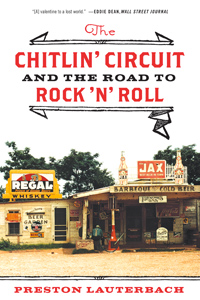 Born February 19, 1895, Brownsville, Kentucky
Born February 19, 1895, Brownsville, Kentucky
Died May 11, 1957, Indianapolis, Indiana
Circuit active: 1941-51
Al Capone’s ouster hardly spelled T-H-E E-N-D for the vice/music correlation in the black band biz.
Denver D. Ferguson moved to Indianapolis, Indiana in 1919. Most of the architecture in the city’s black section, along Indiana Avenue, could give you splinters. Over the next two decades, Denver would help transform the Avenue into a neon-glowing city within the city, where the top acts in black entertainment could be enjoyed any night of the week.
It began with a numbers racket. Denver set up shop for his legit trade, printing, soon after arriving. One of his jobs was to print policy slips for an out-of-state street lottery, the kind that was gaining major prominence in Harlem and the south side of Chicago. Denver introduced his own version of the game to the growing black population on the Avenue. Though he kept his printer’s smock on and his fingers inky, Denver and his brother Sea ascended to kingpin status.
Their cash surplus led, naturally, to two outlets: property ownership and the nightlife business. The Fergusons reigned supreme, and by the end of the 1930s, their vision for a glamorous black Indianapolis had come true, as posh nightclubs flickered up and down the Avenue, black businesses flourished on the strip, and new housing replaced some of the substandard conditions. Sea ran the Cotton Club on the south end of the Avenue and Denver operated Sunset Terrace at the Avenue’s northern terminus.
Trouble caught up to them in 1940. A rash of violence, perpetrated most notoriously in the Avenue club run by the Fergusons’ white rivals, brought unwanted attention. Though the black underworld had largely been safe from racism, the authorities punished only the black-owned Avenue clubs, revoking licenses to sell spirits. Denver sensed the right time to look beyond the Avenue for his livelihood, and in late 1941, he launched Ferguson Bros. Agency, which would quickly become the most powerful black-owned talent firm in the country.
Denver drew controversy like a cigarette butt does lipstick. It stayed all over him for much of his career. For the first time, The Chitlin’ Circuit details how this racketeer brought the chitlin’ circuit to its maximum operational power, running a dozen bands in cycles throughout black America. He developed an intricate web of concert promoters and black nightclub owners, while also training barbers and bartenders to promote his shows in, as he explained, “non-descript places, where the tax man won’t be counting heads at the door,” much as he had cultivated numbers runners to make him rich on the streets of Indianapolis. The taxman eventually caught up to him, as did international scandal.
in cycles throughout black America. He developed an intricate web of concert promoters and black nightclub owners, while also training barbers and bartenders to promote his shows in, as he explained, “non-descript places, where the tax man won’t be counting heads at the door,” much as he had cultivated numbers runners to make him rich on the streets of Indianapolis. The taxman eventually caught up to him, as did international scandal.
Denver Ferguson is an undeservedly obscure figure in American music history, the ultimate gambler, who finally gets his just star treatment in The Chitlin’ Circuit.

